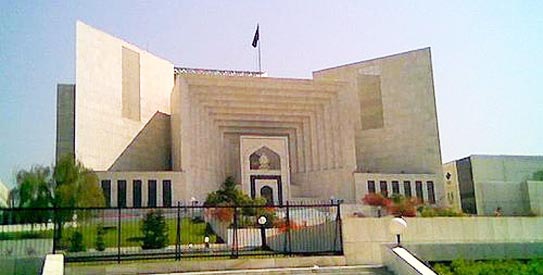
ISLAMABAD: A high-level commission formed by the Supreme Court to investigate the memo issue appeared to have reached a dead end after its fourth hearing on Tuesday when Mansoor Ijaz, the man at the centre of the controversy, again refused to come to Pakistan saying he feared he would be assassinated.
The commission gave a final opportunity to Mr Ijaz to appear at its next hearing on Feb 9.
Unlike earlier two proceedings when Mr Ijaz’s lawyer Akram Sheikh assured the court of his presence on Jan 16 and Jan 24, he refrained from giving any assurance to the commission about the appearance of his client on Feb 9.
The commission, headed by Balochistan High Court Chief Justice Qazi Faez Isa and comprising two other high court chief justices, resumed its proceedings in the Islamabad High Court on Tuesday.
It observed that if Mr Ijaz was making false statements it could only be investigated or he could be cross-examined upon his arrival. If he did not appear before the commission the finding would remain inconclusive and Hussain Haqqani also could not be vindicated.
The commission rejected Mr Ijaz’s plea for recording his statement outside Pakistan and deferred its decision on an application of Mr Haqqani for closing the right of recording the statement of Mr Ijaz in London or Zurich.
It directed the government to allow its secretary, district and sessions judge Islamabad Raja Jawad Hassan Abbas to collect the evidence from Mr Ijaz before he disembarked from the plane and escort him to the commission.
Justice Isa directed the secretary to send a request to the Supreme Court to extend the date for completing the investigation because the cross-examination of key witnesses required more time.
Advocate Naseer Bhutta, a PML-N MNA and counsel for a petitioner, told Dawn that Ijaz’s absence would make the probe more difficult.
Without the statement and relevant record relating to the memo sent to Admiral Mike Mullen the commission could not compile a factual report regarding the origin, authenticity and purpose of the memo.
Interior Minister Rehman Malik remained in the courtroom from 3pm till the end of the proceedings.
During the mid-break Interior secretary Khawaja Siddique Akbar who was sitting next to Mr Malik burst at Mr Ijaz’s counsel who was talking with Mr Malik. This angered lawyers and the matter was brought into the notice of the commission. However, Mr Shaikh forgave the interior secretary. Towards the end of proceedings when the commission advised the lawyers to refrain from giving statements in the media about the case, Advocate Zahid Bukhari, the counsel for Mr Haqqani, half-heartedly accepted the advice after a similar assurance given by Mr Sheikh.
Mr Malik told the commission that during the inauguration of a famous Hyde Park-like corner at F-9 Park he had said something which was wrongly interpreted by some reporters. He produced a video footage and transcript of his talk with the media and assured the commission that if the Parliamentary Committee on National Security directed him to put Ijaz’s name on ECL he would bring the matter before the commission.
He said that Mr Ijaz would be given security of Rangers, Frontier Constabulary, police and army.
After his undertaking, the commission asked Advocate Sheikh to ask his client if his security concerns had been addressed.
Mr Sheikh subsequently told the commission that Ijaz had said he would not come to the Pakistan because he feared that the interior minister might get him assassinated.
He said his client was not satisfied with security arrangements under the interior minister and insisted that his security should be assigned to none other than the Pakistan army.Mr Shaikh requested the court that because of threats to his client’s life in Pakistan his statement might be recorded outside the country.
He said his client feared that the relevant record of the memo case, including original, un-tampered Blackberry handsets, recorded messages, emails, call logs and hand notes might be snatched at the airport within minutes of his arrival.
All the petitioners, except Barrister Zafarullah, supported that the commission should go abroad to collect the evidence and record the statement of the key witness because the Supreme Court in its order of Dec 30 had empowered the commission to collect evidence from Pakistan and abroad.
Barrister Zafarullah said the Inter Services Intelligence would have some relevant information and the commission would examine their evidence as well.
Advocate Bukhari opposed the suggestion of recording of Ijaz’s statement outside the country.
He said there was no law to allow the recording of statement of a witness outside Pakistan.
He said Mr Ijaz had committed contempt of the commission by ignoring its directive by repeatedly remaining absent in the proceedings despite several calls.
He said that after the assurances given by the government there was no justification for his absence.
He requested the court to close the right of recording his statement and conclude the proceeding within the given time.
He produced an affidavit of his client, Mr Haqqani, saying that he had changed his Blackberry sets twice in 2011. He changed an old set in March and then replaced it with an upgraded model ‘Curve’ in October.
He said the discarded sets might be in a drawer at the Pakistan Embassy in the US.
Attorney General Maulvi Anwarul Haq told the commission that a request to obtain the data of Haqqani’s Blackberry sets had been sent to Research-in-Motion (RIM), the service provider of Blackberry, through the Canadian High Commission in Islamabad, but it was yet to respond.
“I was ready to finalise security arrangements with advocate Sheikh, but he expressed certain apprehensions on our arrangements,” the AG said.
“We arranged box security for Mr Ijaz and assigned the IG Islamabad to finalise details with advocate Sheikh, but the latter did not meet him.”













































Dear visitor, the comments section is undergoing an overhaul and will return soon.